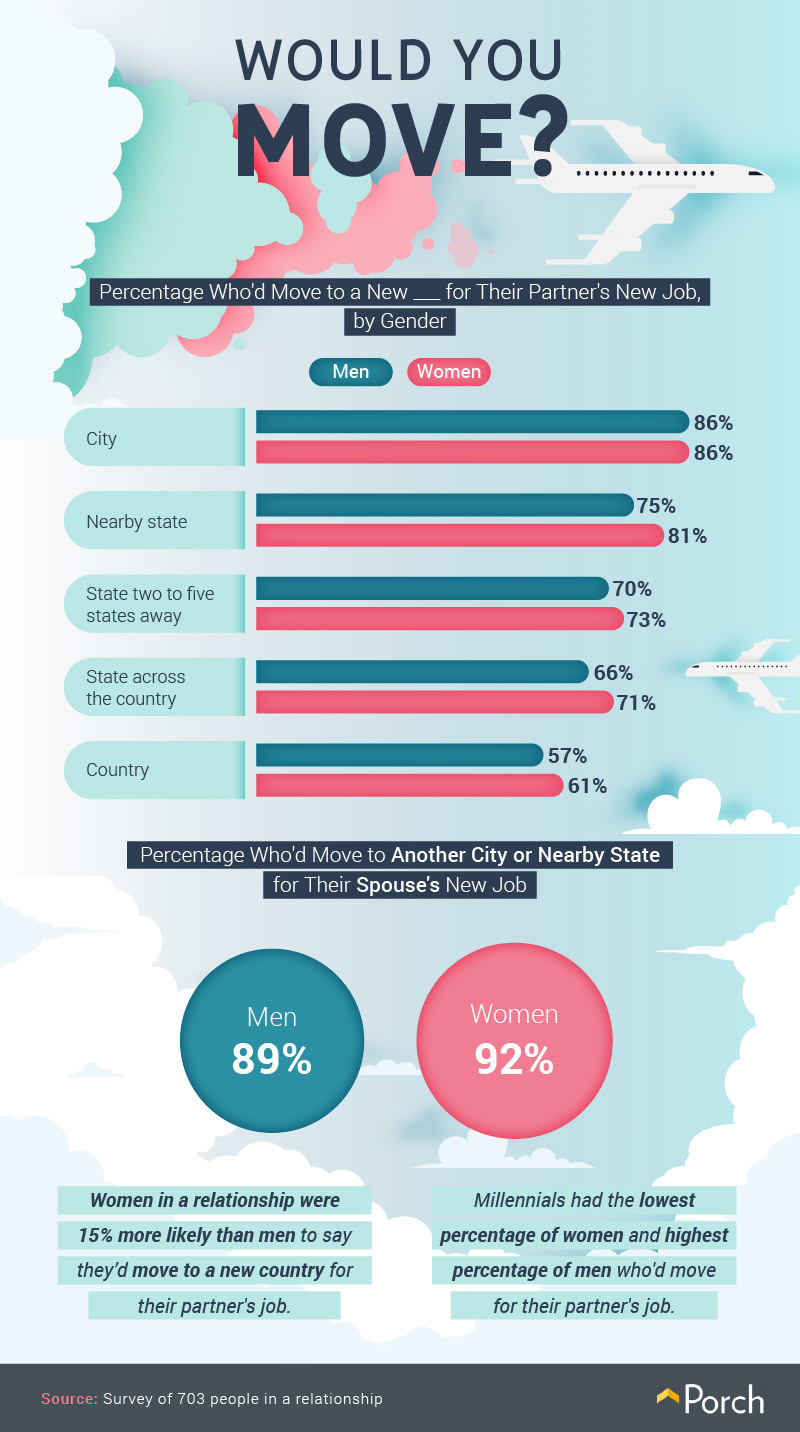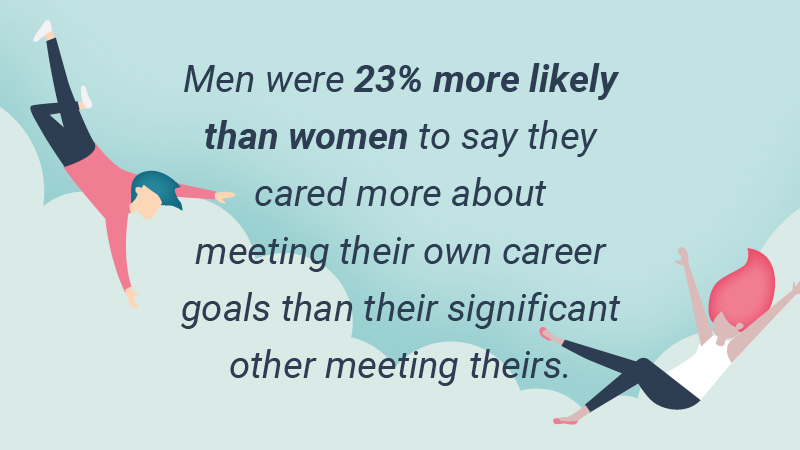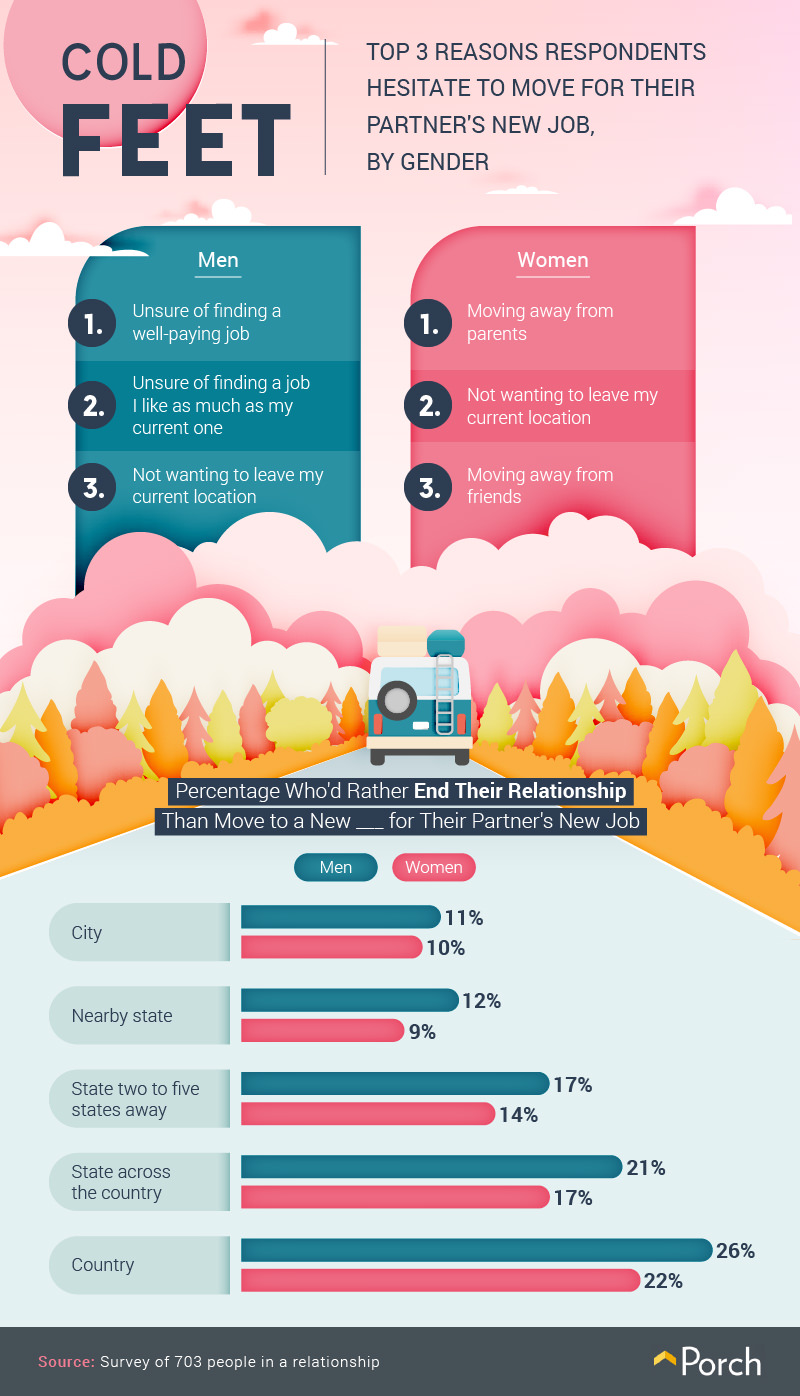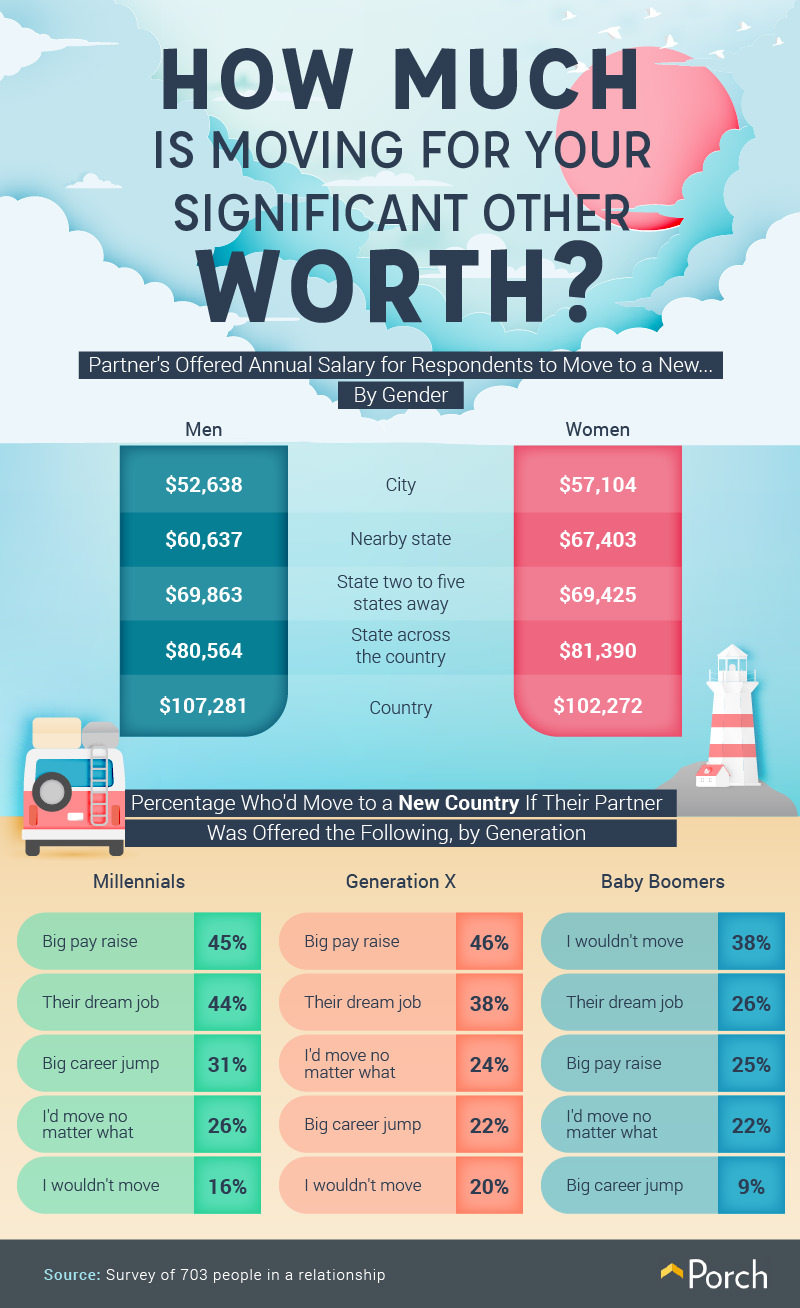Stop in the name of love? More like go. Nearly 36 million Americans move every year, and not all are single. Romantic choices must be made to nurture or end relationships, especially when a partner has a job opportunity away from home. Moving to a new workplace, city, or home can be scary but even more difficult if your significant other doesn’t come with you. So what if the love of your life were to receive a dream job across the country-would you go with them? What about in a neighboring state? Or even across the world? We asked 700 people about their reactions to certain moving situations and 300 respondents about their career and love life choices. Continue reading to see how career moves can impact American romance.

In the mind of a move
Aside from moving to a new city, women were consistently more willing than men to push for their partner’s career. Eighty-one percent of women were ready to move to a nearby state (75 percent for men), 71 percent across the country (66 percent for men), and 61 percent to a new country (57 percent for men). Why the adaptability for women? It could be because, despite progress in the workforce gender gap, women continue to stay home more than men. If a woman (and possibly her family) relies on her partner’s income, it may feel like a clear choice to move for their partner’s career.
Millennials Divorcing
On the other hand, men may be more reluctant to leave their job, even if their partner was offered an opportunity elsewhere. However, millennials had the lowest percentage of women willing to move for their partner’s career. This generation of women is pouring into the workforce, and perhaps their decreased willingness to relocate reflects an increased interest in maintaining their careers. As one would guess, the firmest of love commitments-marriage-left respondents are quite willing to move for their partner’s career. Eighty-nine percent of married men and 92 percent of married women were ready to proceed with their spouse for a professional relocation.

Meeting career goals vs. significant other’s
Men were 23 percent more likely than women to say they cared more about meeting their career goals than their significant others. Playing the devil’s advocate may reflect more of a desire to maintain the status quo than a me-before-you mindset. If they currently support love or family, their career goals may be more important than the potential career goals of their partner. Fortunately, these career gender gaps may shift even more for millennials and future generations, with them, the status quo.
And then what happened?

At the risk of bearing bad news, the odds are against you and your partner if you stay while the other relocates. Fifty-nine percent of people broke up after only one partner moved for a job. That said, there’s no guarantee of staying together even if you move as a team. Even after one person accepted a job offer and their significant other moved, 31 percent of respondents still ended their love. Nevertheless, only 10 percent of people who pushed for their partner’s job regretted it.
Thoughts on Regrets in Relationships
Many may resist regretting a significant life decision, even after a breakup. However complex the past may have been, it brought you to where you are today. Ultimately, this is an argument for living without regret, even when mistakes are made. When couples did move together, though, the biggest issue wasn’t the relationship or job itself-it was missing family and friends. The biggest problem of relocating for a job was missing family, which 52 percent of respondents mentioned. Another 49 percent missed their friends.
Relocation hesitation

Deciding to stay with your partner through relocation may involve more than just the strength or intensity of the love. Other essential relationships, like those with your friends, family, and even home, carry weight when moving for someone else’s career. Women’s top concern was moving away from their parents. However, this probably isn’t just about missing mom and dad. Women are much more likely than men to care for their aging parents. 2 in 3 caregivers are women. However, men mentioned neither friends nor family when explaining why they hesitated to move for their partner’s job. Instead, they were most likely to say uncertainty about finding a new job or even one they liked. These concerns may even concern men’s increased likelihood of ending their relationship rather than moving for their partner’s career.
This better is worth it.

An interstate move, on average, costs $4,300, but the average American would require much more to relocate for their significant other’s job. On average, men wanted their partner’s annual salary to be at least $52,638 when moving to a new city and $80,564 to move across the country. These numbers were relatively similar for women: $57,104 and $81,390, respectively. The adventurer in you may dream of moving to another country with your partner. However, both men and women expected to be offered at least six figures to move outside of the U.S. And as respondents aged, they became even less willing to leave the country for a partner’s job: 38 percent of baby boomers agreed that no amount of money or profession would make them move to a new country, compared to just 16 percent of millennials and 20 percent of Gen Xers.
Making money moves
Women who made more money than their partners were less likely than male breadwinners to move for a partner’s job. For those who made the same amount or less than their partner, though, men and women were similarly ready to push for the other’s job. Of those who refused to move no matter what, men made more. On average, men who wouldn’t move to a new city for their partner made $68,939 yearly, compared to women who earned just $39,874 annually. In other words, men required more financial motivation than women to stay put. Maybe this is another contributor to the persisting gender wage gap.
Romance in moving
To move or not to move? That is the question-well it may be if your significant other happens to get a job offer out of town. For most women, the answer was to move. And for most men? Move as well, just not as often. However, men were more likely to end their love than relocate for their partner’s career. New cities, states, and jobs may go hand in hand with new connections. Possible breakups aside, career opportunities are significant enough to discuss openly with your partner. Maybe they will be more open to a new city or country than you think. And if not, having that information before a job opportunity presents itself is beneficial.
Move Your Relationships to a Better Start
This way, you can make the best romantic and professional decisions. If you decide to move, equip yourself and your partner with the tools needed to thrive in any location. You’ll undoubtedly have questions about your new home and where to turn for home improvement. For any questions, concerns, or ideas, visit Porch for well-trained experts in your area.
Read more: Best Herpes Support Forums on the Internet: Get Help 24*7
Visualizations have a specific location
Responses were grouped in the visualizations were have a specific location (e.g., city, state, or country). For analysis of quantitative values, moved outliers not to exaggerate findings. A limitation of this study is that we utilized self-reported data, and this method may include side effects of selective memory, exaggeration, attribution, and telescoping. However, we made sure our survey questions were objective and unbiased. We also did not perform statistical testing on the data; all claims are based on means alone. This study is intended for entertainment use only, and future research should approach this topic more academically and rigorously.
Originally posted in Porch.com



